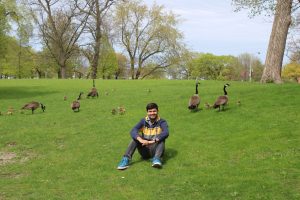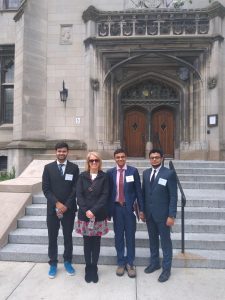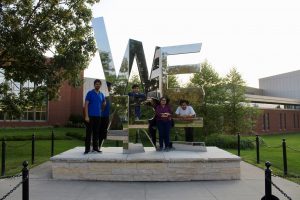I still remember the day, the day I was traveling to Delhi to attend a youth forum and suddenly an email appears in my account. ‘Congratulations on being selected for the prestigious SN Bose Program read the email’, What? Is this real? at first, I couldn’t believe it and asked my friend who was sitting right next to me on the bus to read the e-mail. He was silent for a minute, Waquar you are going to the United States, the land of opportunities, he embraced me as he uttered those words, and this was one of the happiest moments in my life to this day.
I couldn’t sleep that night and started looking for professors and I was glad that Dr. Sanjay Srinivasan from Penn State agreed to host and supervise my research. Although the visa process was a bit stressful and took a lot of time, I was able to secure my visa and got my tickets. I landed in Philadelphia via Heathrow and following a transit I landed in State College, the home to Penn State and the gateway to Central Pennsylvania. The transition to a new environment went smooth, as I lived in a foreign land (Riyadh) for a couple of years. The green, serene university campus of Penn State offers the right environment for research and a wide range of restaurants always kept fueling my ideas with awesome food.
From farm to pharmacology, trucks to dining table, take a moment to look around and see how our modern day lives depend on petroleum products. Everything has a price and the challenge we face today is climate change. Although CO2 sequestration in saline aquifers is one of the most promising solutions to mitigate the effects of carbon emissions, yet there are many avenues for for skilled hands to research upon. Therefore, as part of Penn State Geostatistical Geomodelling Industrial Applications Research Group, I was involved in modeling the phenomenon of CO2 plume migration in saline aquifers by the Lattice Boltzmann method. Though I had some research experience in synthesis and characterization of nanomaterials and enhanced oil recovery projects, the computational work was new to me and I had to put in some additional effort. But in the end, everything turned out beautifully and this goes with the saying if you think you CAN, then you WILL!
This internship gave me an unprecedented experience and opened the doors for my graduate school. I also got an opportunity to attend the 20th Annual Conference of the International Association for Mathematical Geosciences chaired by Dr. Srinivasan and was able to meet some of the best researchers in the world.
Unites States is a diverse country, each state is unique and beautiful. If you like to travel, America must be on your list. The orientation program at the University of Chicago offered all scholars the opportunity to cultivate, welcome, and nurture a lifelong friendship. An evening at Lake Michigan, followed by the famous Chicago style pizza added colors to my American experience. I was amazed to see the architecture of Bean (Millennium Park) and Wills Tower. We also had a research group dinner followed by a base ball match. Americans are extremely friendly, courteous and helpful, they are always ready to take that extra mile to help, and that’s something I wish to cultivate back in India. I also travelled to New York and Washington DC, walked down 5th Avenue to Time Square, visited the American Museum of National History, Central Park, Smithsonian museums in DC to the Lincoln Memorial, all I can say is my experience of 2019 was the best and this sums up my research internship in the United States.
I would like to take this opportunity to thank the IUSSTF, Winstep Forward, NISERB for honoring me as an SN Bose Scholar 2019. I thank Pennsylvania State University and Rajiv Gandhi Institute of Petroleum Technology for their permissions. My sincere thanks to Dr. Sanjay Srinivasan for his time, support and guidance during the internship program. Thanks to Sravan (IUSSTF), Eric, Mic, Kati, and Lexi (Winstep); Brian, Michelle and Missy (Penn State) for their constant help and assistance throughout the process. Thank you, Akshat, Kshitij, and Ismael, for providing fruitful advice and clarifying my research related queries. Thanks to Nirjhor and most importantly I thank my Parents.
I am also thankful to Krishna Raghav and Ravi Shankar (EOR Research Group, RGIPT), my friends (Girish Joshi, Abhishek, Durgesh, Mrigya, and others) for keeping me motivated. A big thanks to all the former Bose scholars who came out of their comfort zone to answer my queries. I appreciate you all!